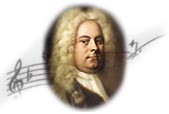|
|


 While
G.F. Handel's Messiah is the most dramatic and popular of his oratorios,
he composed several other outstanding oratorios with biblical and religious
themes, among them Acis and Galatea (1720), Esther (1732),
Israel in Egypt (1736-37), Saul (1739), and Judas Maccabeus
(1746). These works brought the composer ever more fame and recognition. While
G.F. Handel's Messiah is the most dramatic and popular of his oratorios,
he composed several other outstanding oratorios with biblical and religious
themes, among them Acis and Galatea (1720), Esther (1732),
Israel in Egypt (1736-37), Saul (1739), and Judas Maccabeus
(1746). These works brought the composer ever more fame and recognition. |
The English
libretto for Judas Maccabeus was written by the Reverand Thomas Morell,
with texts taken from I Maccabees (from the Apocrypha) and a few details
from Josephus' Jewish Antiquities. The libretto was "designed
as a compliment to the Duke of Cumberland upon his returning victorious from
Scotland," having defeated Bonnie Prince Charlie, the Young Pretender,
at Culloden, Scotland.
Handel's Oratorios and Eighteenth-Century Thought
(Cambridge University Press, 1995) outlines political parallels between
Judas' victory over the Syrians and that of the Duke of Cumberland's
over the Jacobites. Judas, she writes, unifies a nation disrupted from
within by Hellenizers co-opting foreign hellenizing Syrian forces. Similarly,
the Duke of Cumberland unifies a nation disrupted from within by Jacobites
co-opting foreign French Catholic forces.
Composed over the summer 1746, Judas Maccabeus was first performed
the following April in London, at the Covent Garden Theatre.
This
selection from the German classic repertoire is part of a recording
made between 1928-1930 by Dr. Hermann Schildberger (1899-1974), the
music director of the Reform Congregation of Berlin. He also served
as conductor for the professional choir of one hundred voices, two organists
and several young soloists (among the most brilliant singers of the
time). The recording was later cleaned up and enhanced, using advanced
sound technology — a project begun in Australia
and completed in Israel.
In this selection
the German words to the hymn Adon Olam ("Lord of the World")
are sung to a musical selection from Judas Maccabeus, "Lo, the
conquering hero cometh." It appears on the double-CD, "The Musical
Tradition of the Jewish Reform Congregation in Berlin," produced by the
Beth Hatefutsoth Feher Jewish Music Center, and is included here courtesy
of the Museum.
|
Lord of the world who has reigned
From the time's beginning,
Since Creation's day was accomplished,
Walking uprightly after His intent.
When everything emerged from nothing,
His might will remain alone,
As He was in majesty,
He was and ever will be so.
His being is might and splendor,
He is the redemption's light,
A rock and protector in testing time,
When my mouth praises Him imploringly,
He is my salvation, a radiant light.
To Him I commend my body and spirit
God is with me, I shall nothing fear.
|
 "Lord
of the World" from Judas Maccabeus by George Friedrich
Handel. "Lord
of the World" from Judas Maccabeus by George Friedrich
Handel.
Adapted and arranged for choir by Hermann Schildberger.
from: "The Musical Tradition of the Jewish Reform Congregation
in Berlin," produced by the Beth Hatefutsoth Feher Jewish Music
Center.
Courtesy of Beth Hatefutsoth, Museum of the Jewish Diaspora,
Jewish Music Dept.
|
KISLEV
Table of Contents
|
|
|
|



